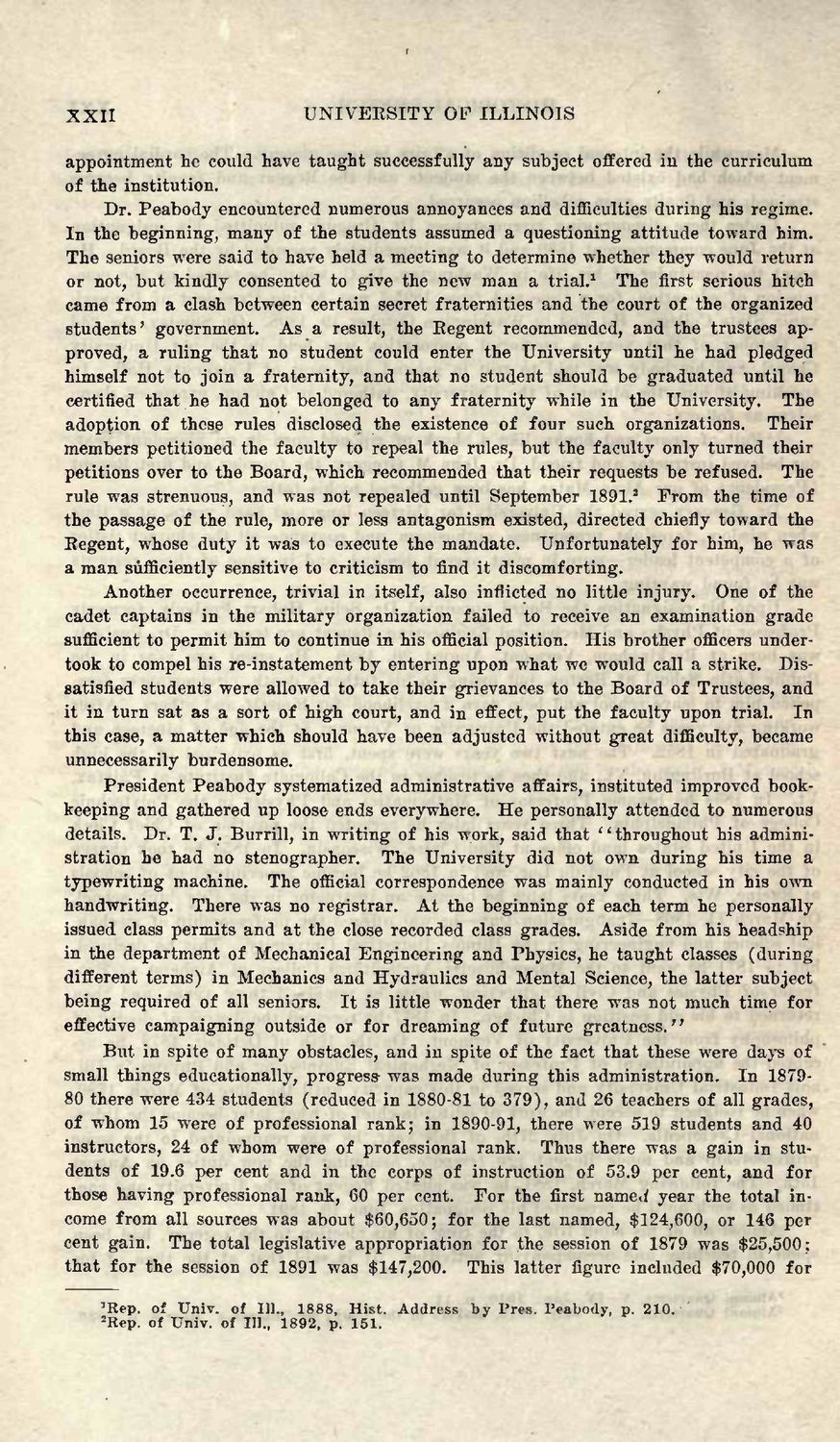| |
| |
Caption: Book - Early History of University (1916)
This is a reduced-resolution page image for fast online browsing.

EXTRACTED TEXT FROM PAGE:
XXII U N I V E E S I T Y OP I L L I N O I S appointment he could have taught successfully any subject offered in the curriculum of the institution. Dr. Peabody encountered numerous annoyances and difficulties during his regime. In the beginning, many of the students assumed a questioning attitude toward him. The seniors were said to have held a meeting to determine whether they would return or not, but kindly consented to give the new man a trial. 1 The first serious hitch came from a clash between certain secret fraternities and the court of the organized students' government. As a result, the Eegent recommended, and the trustees approved, a ruling that no student could enter the University until he had pledged himself not to join a fraternity, and that no student should be graduated until he certified that he had not belonged to any fraternity while in the University. The adoption of these rules disclosed the existence of four such organizations. Their members petitioned the faculty to repeal the rules, but the faculty only turned their petitions over to the Board, which recommended that their requests be refused. The rule was strenuous, and was not repealed until September 1891. 3 From the time of the passage of the rule, more or less antagonism existed, directed chiefly toward the Eegent, whose duty it was to execute the mandate. Unfortunately for him, he was a man sufficiently sensitive to criticism to find it discomforting. Another occurrence, trivial in itself, also inflicted no little injury. One of the cadet captains in the military organization failed to receive an examination grade sufficient to permit him to continue in his official position. His brother officers undertook to compel his re-instatement by entering upon what we would call a strike. Dissatisfied students were allowed to take their grievances to the Board of Trustees, and it in turn sat as a sort of high court, and in effect, put the faculty upon trial. In this case, a matter which should have been adjusted without great difficulty, became unnecessarily burdensome. President Peabody systematized administrative affairs, instituted improved bookkeeping and gathered up loose ends everywhere. He personally attended to numerous details. Dr. T. J . Burrill, in writing of his work, said that ' ' throughout his administration he had no stenographer. The University did not own during his time a typewriting machine. The official correspondence was mainly conducted in his own handwriting. There was no registrar. At the beginning of each term he personally issued class permits and at the close recorded class grades. Aside from his headship in the department of Mechanical Engineering and Physics, he taught classes (during different terms) in Mechanics and Hydraulics and Mental Science, the latter subject being required of all seniors. I t is little wonder that there was not much time for effective campaigning outside or for dreaming of future greatness." But in spite of many obstacles, and in spite of the fact that these were days of small things educationally, progress- was made during this administration. In 187980 there were 434 students (reduced in 1880-81 to 379), and 26 teachers of all grades, of whom 15 were of professional rank; in 1890-91, there were 519 students and 40 instructors, 24 of whom were of professional rank. Thus there was a gain in students of 19.6 per cent and in the corps of instruction of 53.9 per cent, and for those having professional rank, 60 per cent. For the first namej year the total income from all sources was about $60,650; for the last named, $124,600, or 146 per cent gain. The total legislative appropriation for the session of 1879 was $25,500; that for the session of 1891 was $147,200. This latter figure included $70,000 for 'Rep. of Univ. of 111., 1888, Hist. Address b y Pres. Peabody, p. 210. ' 2 Rep. of Tjniv. of 111., 1892, p. 151.
| |